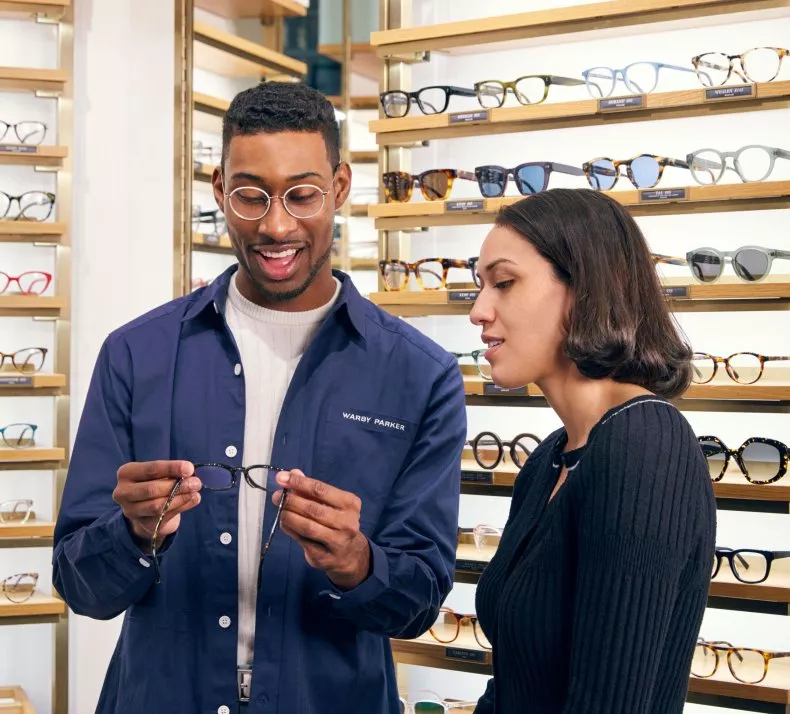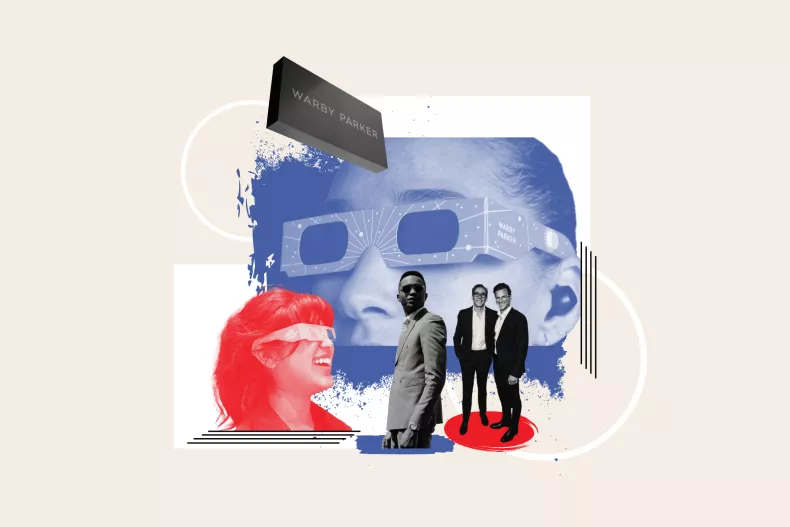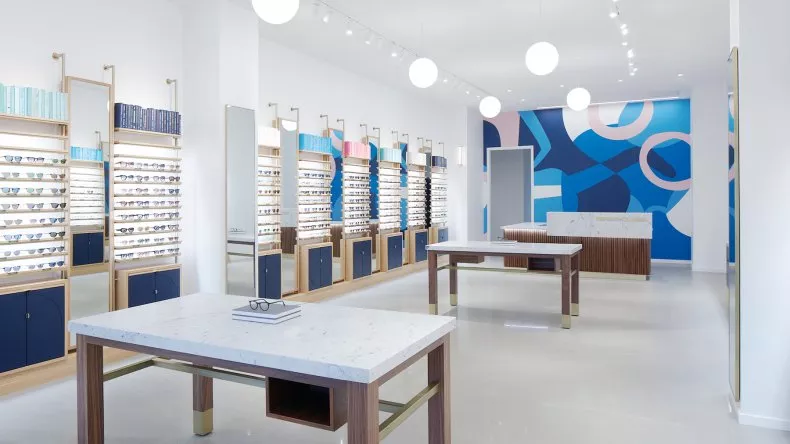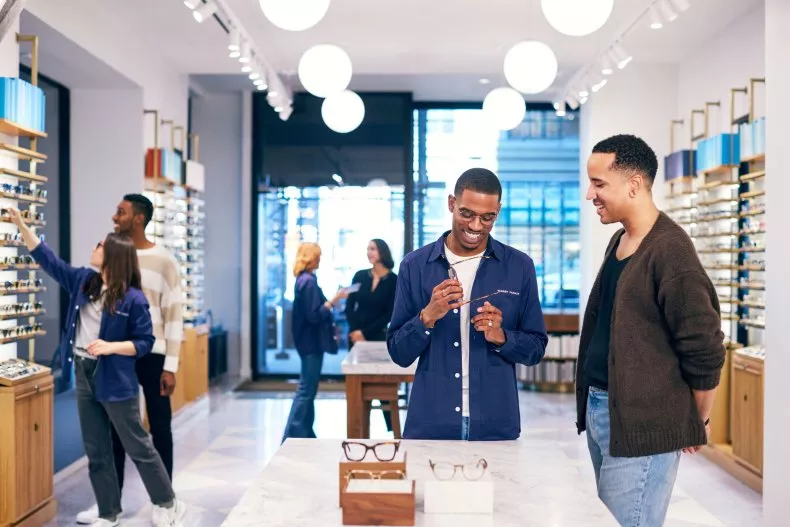Warby Parker Aims for ‘Seamless’ Growth, Finding Fun in Wearing Glasses
For more than a decade, Warby Parker has been a leader in the eyewear industry, offering a variety of frames at reasonable prices.
“Warby [Parker] was founded with a mission to inspire and impact the world with vision, purpose and style,” Sandy Gilsenan, Warby Parker’s chief retail and customer experience officer, told Newsweek in an interview.
As a longtime eyeglasses wearer and Warby customer, Gilsenan said the company is thinking about eyewear in a different way and building a different kind of business—”one that scales quickly and also does good in the world [while] not charging a premium.”
Although it began as an online retailer, Warby Parker now has more than 200 store locations, including 40 that opened in 2023.
And for the second year in a row, Warby Parker has landed at the top spot on Newsweek‘s ranking of America’s Best Retailers in the eyewear category.

Warby Parker employee helps a customer find the right frames. Warby Parker was named as the top eyewear company on Newsweek’s recent ranking of America’s Best Retailers 2024. According to data partner Statista, Warby…Warby Parker
Newsweek, in partnership with Statista, recently ranked the top retail companies in the country across 40 different industries that are keeping the in-person shopping experience alive for customers.
Based on more than 7,000 shopper surveys, the various companies were rated by their scores for likelihood of recommendation and other criteria, including quality and price of products, customer service, store layout and atmosphere, and accessibility.
With an overall score of 92.15, Warby Parker was also included in the top 10 overall companies on the ranking across all categories.
Warby Parker, which has also been included on several other Newsweekrankings, including America’s Best Customer Service 2024, America’s Greatest Workplaces for LGBTQ+ 2024 and Most Trustworthy Companies in America 2024, began in 2010 with the idea that glasses are too expensive and people deserve to find quality and stylish frames without breaking the bank.
Historically, the only way to try on new prescription glasses was to go to a store or doctor’s office to browse for several pairs. But Warby Parker revolutionized the process by offering an online, direct-to-consumer experience with quality frames starting below $100.
The company allows customers to pick five frames from its Home Try-On collection that will be shipped to their home for free with a preprinted return shipping label. Customers can spend time trying on the nonprescription frames before sending them back and ordering the ones they love the best.
Additionally, the company offers a Buy a Pair, Give a Pair program that has distributed more than 15 million pairs of glasses to people in need around the world.

For the second year in a row, Warby Parker has landed at the top spot on Newsweek’s ranking of America’s Best Retailers in the eyewear category.Photo-illustration by Newsweek/Getty
Jaime Bettencourt is the senior vice president of brand strategy at Mood Media, an experiential media company that advises organizations on how to redefine the retail customer experience.
Bettencourt told Newsweek that brands must “stand out in a world of sameness” by making retail experiences relevant and meaningful to customers. When in a store, she said customers crave an emotional and community connection they don’t get online.
“Shoppers really crave experiences, and it’s not just products,” she said. “They’re seeking inspiration, they want to learn something new, they want to be empowered with some form of hands-on experience and they want it to be personal.”
As the business grew, Warby Parker started to set up brick-and-mortar stores to offer the in-person shopping experience customers wanted. Gilsenan added that 75 percent of customers who shop in Warby Parker stores have interacted with the company online.

The in-store layout of a Warby Parker store in Massachusetts. Companies on the America’s Best Retailers 2024 ranking were rated on several factors, including customer service, store lay out, atmosphere, accessibility and quality, price and…Warby Parker
The challenge for Warby Parker, Gilsenan said, is maintaining a relationship with customers while merging the virtual and in-person experience so that customers can take what they learn about the brand online and bring it into the store.
“It’s important not just to open stores but to make sure stores are a place where we can meet customers [who] don’t want to necessarily shop online,” Gilsenan said. “We want to continue to scale Warby Parker but make sure that it’s seamless and convenient for customers. And fun—it should be fun to wear glasses; it should be fun to shop for glasses.”
Melodie van der Baan is a retail expert who has worked for years in the fashion world as a distributor, boutique owner and now the co-founder and CEO of Max Retail, a company that helps independent retailers sell their excess inventory.
She told Newsweek in an interview that as retailers grow, consistency of performance and message is often the most difficult but most important thing a company can do.
“I think what a lot of businesses are missing is a clear diagram of what the common experience is,” she said. “Every retailer has to build their brand, their culture, their consistency. And that’s one of the biggest drop-offs I see in retail today.”
Van der Baan said that the first moments a customer walks into a store are the most critical. The layout, for example, is “an engineering science” for retailers.
Everything from music that is playing, the lighting and whether an employee greets a customer when they first enter a store sets the mood, reinforces brand identity and can determine if shoppers leave or stay to look around the store.
According to Mood Media’s 2023 In-Store Trends Report, 70 percent of shoppers surveyed said having “branded music” is important for their in-store experience and 85 percent said the same about having the right scent in a store.

Warby Parker employees help customers browse frames in a store. The company achieved an overall score of 92.15 on the
America’s Best Retailers 2024 ranking. Warby Parker
Jamie Bettencourt of Mood Media told Newsweek that making sure brands have an authentic message is essential for a thriving retailer. The more anchored a company is in its brand and the more that brand is integrated into the store space, the more of a seamless story it creates for customers.
Over the last few years, Warby Parker has improved how customers shop in-store by creating a holistic vision care experience, including eye exams and licensed and certified opticians in each store.
Looking ahead, Warby Parker is hoping to continue to build on the momentum it had last year by opening 40 more stores by the end of 2024.
“We see a path for us to have 900 stores, which is kind of incredible for us,” Gilsenan said.
For her, being an omnichannel brand still feels unique in the current place and time, even as customer demographics and desires shift.
“It’s really reimagining everything that a company and an industry can be,” she said. “We really believe that every decision should be made for our customers, our employees, our shareholders, our community, our environment and our partners in mind. And that really creates a culture of pride in our work.”


